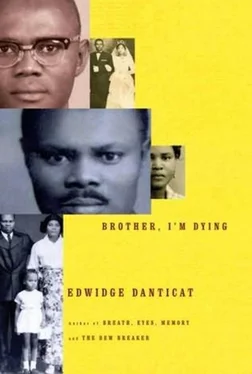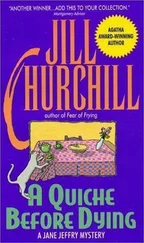***
Going down in the hospital elevator, still not fully understanding all that had taken place, I kept my eyes on the flashing numbers and avoided looking at my father, who even before he was sick had always been uneasy in unfamiliar surroundings. Now he seemed even more apprehensive, lost in the isolated world of the unwell.
In the car I broached again the very first question Dr. Padman had posed to him.
“How do you feel, Papa?” I asked in Creole. “Ki jan w santi w?”
Nou la, he said. Not bad. Okay, even. Not by usual standards, but what he’d come to consider okay. Not coughing too much. Not breathing too hard. Driving was fine because he was not exerting too much energy, but walking was difficult. Walking was hell.
“I’m going to drop you off. I’ll be home a little bit later,” he said as we approached his and my mother’s house, a four-bedroom, two-story brick single-family they’d purchased eighteen years ago, after living in a series of small apartments all over Brooklyn.
“Come home and rest,” I said.
He had a meeting at the car service business he ran with my uncle Franck, the younger of his two brothers and the only one of his four surviving siblings living in the United States.
My stomach was cramping again, so hard and so frequently that I wondered if perhaps the herbalist might be right after all. Was something going on with me? I asked my father to drop me off at a nearby pharmacy, where I picked up a pregnancy test.
***
My mother wasn’t home when I got there, so I locked myself in my parents’ tiny guest bathroom and let a stream of urine run over one of the two plastic sticks in the package. The frosted glass on the bathroom window kept out the afternoon light, and the small space, crowded with my mother’s vases of dried roses and potpourri bowls, seemed dark, even with the light on. I squinted to examine the results. One pink line popped up, then two. I examined the box again to make sure I was interpreting correctly. One line meant not pregnant, two meant pregnant, a symbolism that of course made sense. Before the results, one believed oneself to be one; then suddenly one was two.
I leaned against the sink, grabbing hold of the faucet so I could remain on my feet. My father was dying and I was pregnant. Both struck me as impossibly unreal.
Cradling the now wet plastic wand, I slipped to the floor and sobbed. I was afraid of losing my father and also struck with a different kind of fear: baby panic. Everything was suddenly mixed up in my head and leading me to the darkest places. Would I carry to full term? Would there be complications? Would I die? Would the baby die? Would the baby and I both die? Would my father die before we died? Or would we all die at the same time?
On the other hand, bringing a child into the world seemed to be about anything but death. It was a huge leap of faith in the future, an acknowledgment that one would somehow continue to exist.
I had to speak to my husband. I blindly searched my purse for my cell phone and dialed his number.
“Guess what?” I blurted out. “We’re pregnant.”
Under different circumstances, I might have rushed back home, greeting him at the airport with an armful of roses addressed to “Daddy.” Or I might have teased him on the phone, forced him to pry the news out of me. But there was no other way to do it on this particular day. Still, I held back from telling him about my father. Perhaps I didn’t want to hear myself say it. Or maybe I didn’t want to dampen his excitement, to have these two pieces of news abruptly collide for him as they had for me.
“A baby? How wonderful is that?” My husband was cheering loudly. I could imagine his calm, reassuring smile, broader with delight.
“I can’t believe it,” he shouted, after it had sunk in a bit longer. “We’re going to be parents!”
Aside from my husband, I decided, I would tell no one about the baby for a few days, not even my parents. That weekend, my brother Kelly, a musician and computer programmer, who out of all of us most resembled my father, was coming for a visit from his home in Lancaster, Massachusetts. We all needed to concentrate on a family strategy to deal with my father’s diagnosis and we were not going to come up with one if everyone was distracted by the baby. Besides, I couldn’t fully keep both realities in mind at the same time, couldn’t find the words to express both events. I closed my eyes and held my breath, forcing myself to recite it as a mantra. My father is dying and I’m pregnant.
I stepped out of the bathroom and called my youngest brother, Karl, at the brokerage house where he works. I told him what Dr. Padman had said, and immediately a debate emerged: Should the doctor have told me about our father’s prognosis and not have told our father? It was inconsiderate at best, Karl thought, and maybe even unethical.
“It seems odd.” He sounded infuriated: at me, at the doctor, at the diagnosis, at the disease. “The doctor has no right to share information with you that he’s withholding from Dad.”
Maybe I shouldn’t have called him at work, I thought. I should have waited until he got home. There was always so much happening in his office. People were always peeking in; his phone was always ringing. He was probably under pressure. I had sprung this on him out of nowhere, told him too quickly, and he’d had no choice but to respond from the gut, unfiltered.
Of the four of us, my brothers Karl and Bob, who lived only a few blocks away from my parents’ house in East Flatbush, saw my father most often. They, more than anyone, except maybe my mother, were going to have to watch him die.
“Are you going to tell Dad what the doctor said?” Karl asked, his voice firm, terse.
“No,” I said, equally unyielding.
I hadn’t decided until that moment that I wouldn’t have that conversation with my father. Maybe Karl or my other brothers could, or even my mother would, but I knew I wouldn’t be able to do it. I now found myself rallying on Dr. Padman’s side. What would be the use of telling Dad? He would probably become disheartened, heartbroken, depressed. On the other hand, he was a religious man. Maybe he would refute his prognosis outright, call it a lie, and not believe it at all. Still, I didn’t think I’d be able to tell him. Maybe it was cowardly, but I couldn’t.
“We should tell Dad what the doctor said,” Karl insisted. “He should have been told. He has a right to know. Wouldn’t you want to know?”
Of course I’d want to know. I agreed with him in principle. But suddenly I wondered: if my father ever found out some other way, would he interpret both the doctor’s and my not telling him as a sign that things were even more dismal than they actually were?
That afternoon, before my father came home, as my mother prepared his supper I told her a milder version of what Dr. Padman had told me.
“The doctor doesn’t think he’s doing well,” I said as she cut up a small squash and slipped the pieces into a pot of boiling water to make a stew. “The doctor says he might not recover.”
I kept needlessly repeating the word “doctor” as if to stress that I was the messenger and not the source.
Securing the lid on the pot, my mother turned off the burners on the stove, poured herself a glass of water from the leaky faucet over the sink and sat down across from me at the bare kitchen table.
“I knew it was something bad,” she said, massaging the sides of her round face with her fingers. Her voice was soft, slow, almost a whisper. “He just seems to be melting away.”
What she cooked that night was a much simpler version of what she’d originally intended, a thin pumpkin soup rather than a full stew. The soup remained untouched, however. None of us felt like eating.
Читать дальше












